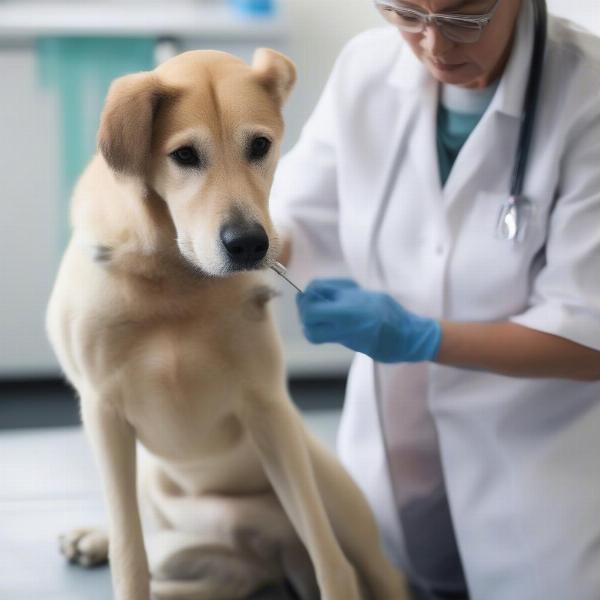Dog back leg shaking can be a concerning sign for any pet owner. It can range from a slight tremor to more violent shaking and can be caused by a variety of factors, from simple muscle fatigue to more serious underlying medical conditions. Understanding the potential causes, associated symptoms, and available treatment options is crucial for providing your furry friend with the best possible care.
Understanding Why Your Dog’s Back Legs are Shaking
There are numerous reasons why a dog’s back legs might shake. Identifying the underlying cause is the first step towards effective treatment. Some common causes include:
- Muscle Fatigue or Overexertion: Just like humans, dogs can experience muscle fatigue after strenuous exercise. This is a common cause of temporary leg shaking, especially in active breeds.
- Pain: Pain in the hips, knees, or other parts of the back legs can cause shaking as a way for the dog to alleviate discomfort. Arthritis, injuries, and infections are potential sources of pain.
- Neurological Issues: Conditions affecting the nervous system, such as degenerative myelopathy, intervertebral disc disease, or seizures, can manifest as back leg shaking.
- Generalized Tremor Syndrome (GTS): Also known as “white shaker dog syndrome,” GTS is characterized by full-body tremors, often more pronounced in the hind legs.
- Low Blood Sugar (Hypoglycemia): Low blood sugar can cause weakness and trembling, including in the back legs. This is more common in small breeds or puppies.
- Toxicity: Ingesting certain toxins can lead to neurological symptoms, including shaking.
- Old Age: Senior dogs may experience muscle weakness and tremors in their back legs due to age-related degeneration.
Identifying Accompanying Symptoms
While leg shaking itself is a symptom, observing other accompanying signs can help pinpoint the underlying cause. These might include:
- Limping or Lameness: Indicates a potential injury or pain in the affected leg.
- Difficulty Standing or Walking: Suggests a more serious neurological or musculoskeletal issue.
- Changes in Appetite or Behavior: Could be related to pain, discomfort, or systemic illness.
- Vomiting or Diarrhea: May suggest toxicity or another underlying health problem.
- Excessive Panting or Vocalization: Can be signs of pain or distress.
- Loss of Coordination: Could point to a neurological condition.
When to Seek Veterinary Care
If your dog’s back leg shaking is persistent, severe, or accompanied by other symptoms, it’s essential to seek veterinary care immediately. Early diagnosis and treatment can significantly improve the outcome, especially in cases of serious underlying conditions.
Diagnosing the Cause of Shaking
Your veterinarian will conduct a thorough physical examination and may recommend additional diagnostic tests, such as blood work, X-rays, or neurological examinations, to determine the underlying cause of the shaking.
 Veterinarian examining a dog’s back leg
Veterinarian examining a dog’s back leg
Treatment Options
Treatment for dog back leg shaking depends on the underlying cause. It might include:
- Rest and Pain Management: For muscle fatigue or minor injuries.
- Medications: To address pain, inflammation, or underlying medical conditions.
- Physical Therapy: To improve strength and mobility.
- Surgery: In some cases, surgery may be necessary to correct structural issues or remove tumors.
- Supplements: For joint health and to support overall well-being.
Preventing Future Episodes
While not all causes of back leg shaking are preventable, some measures can help reduce the risk, such as:
- Regular Exercise: Maintaining a healthy weight and muscle tone can prevent muscle strain and fatigue.
- Proper Nutrition: A balanced diet rich in essential nutrients supports overall health and can prevent deficiencies that might contribute to weakness.
- Joint Supplements: For older dogs or those prone to joint problems, supplements can help maintain joint health.
- Avoiding Toxins: Keep potentially harmful substances out of your dog’s reach.
Conclusion
Dog back leg shaking can be a symptom of various underlying conditions, ranging from minor to serious. Observing your dog closely, recognizing accompanying symptoms, and seeking prompt veterinary care are crucial for ensuring their health and well-being. By understanding the potential causes and treatment options, you can help your furry friend live a happy and active life.
FAQ
-
How can I tell if my dog’s back leg shaking is serious? If the shaking is persistent, severe, or accompanied by other symptoms like limping, difficulty walking, or changes in behavior, it’s important to seek veterinary attention.
-
Is back leg shaking more common in certain breeds? Yes, some breeds are predisposed to certain conditions that can cause back leg shaking, such as degenerative myelopathy in German Shepherds.
-
Can anxiety cause back leg shaking in dogs? While anxiety can cause trembling, it’s less likely to be localized to the back legs.
-
What should I do if my dog suddenly starts shaking its back legs? Observe your dog closely for other symptoms and contact your veterinarian for advice.
-
Are there any home remedies for dog back leg shaking? It’s best to avoid home remedies without consulting your veterinarian. Treating the underlying cause is essential for effective management.
-
Can back leg shaking be a sign of old age? Yes, muscle weakness and tremors can be more common in senior dogs.
-
How can I make my dog more comfortable if their back legs are shaking? Provide a comfortable, supportive resting place and avoid forcing them to move unnecessarily. Consult your veterinarian for pain management options.
Related Articles
- dogs back legs shaking while standing
- why are my dogs back legs shaking
- shaking hind legs in dogs
- dog crouching
ILM Dog is a leading international online resource dedicated to providing expert advice on dog care, breed information, health, training, and nutrition. We offer a wealth of resources to help dog owners around the world provide the best possible care for their canine companions. For further assistance or information, please contact us at [email protected] or call us at +44 20-3965-8624. ILM Dog is committed to helping you build a strong, healthy, and happy relationship with your dog.